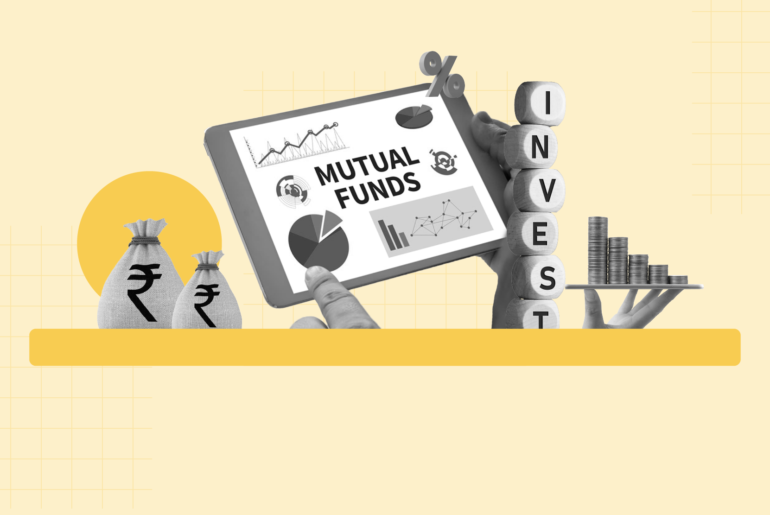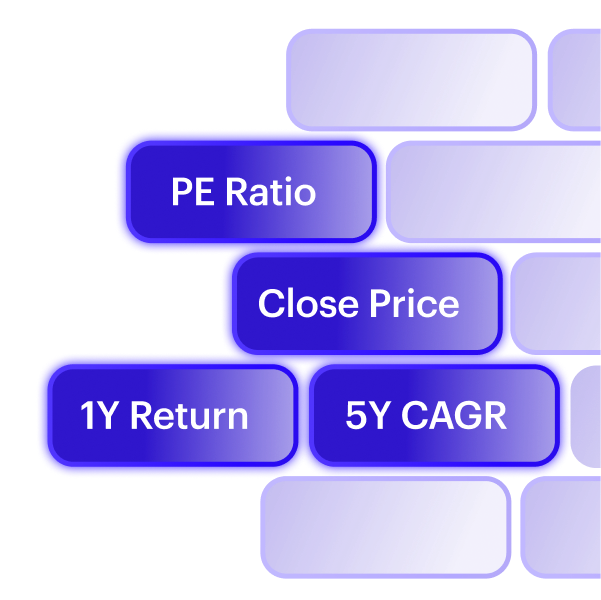Last Updated on Mar 16, 2025 by Nikita Malik
The volatility of a stock represents the degree of risk associated with it. Understanding the most volatile stocks can help you manage risk and balance your portfolio effectively. This article explores what volatile stocks are, how to identify the most volatile stocks on the NSE, and highlights the best high volatile stocks of the Nifty 500. Additionally, we’ll explore the filters used on the Tickertape Stock Screener to compile this list.
Table of Contents
Most Volatile Stocks in India (2024)
| Name | Sub-Sector | Market Cap (Rs. in cr.) | Close Price (Rs.) | PE Ratio | Volatility (%) | Beta |
| IFCI Ltd | Specialised Finance | 13,823.28 | 53.33 | 133.37 | 68.34 | 1.20 |
| Housing and Urban Development Corporation Ltd | Specialised Finance | 40,850.77 | 216.43 | 19.30 | 64.49 | 1.69 |
| Vodafone Idea Ltd | Telecom Services | 57,502.35 | 7.96 | -1.84 | 63.17 | 1.14 |
| Rail Vikas Nigam Ltd | Specialised Finance | 90,135.42 | 438.90 | 57.25 | 62.03 | 1.53 |
| Mazagon Dock Shipbuilders Ltd | Shipbuilding | 80,997.70 | 4,012.45 | 41.82 | 61.31 | 1.51 |
| NBCC (India) Ltd | Construction & Engineering | 25,193.70 | 93.97 | 62.74 | 60.02 | 1.68 |
| Zee Entertainment Enterprises Ltd | TV Channels & Broadcasters | 11,586.75 | 119.21 | 81.94 | 59.85 | 1.35 |
| Inox Wind Ltd | Heavy Electrical Equipments | 27,765.60 | 212.01 | -686.59 | 58.96 | 1.90 |
| BSE Ltd | Stock Exchanges & Ratings | 56,386.96 | 4,284.05 | 72.44 | 58.20 | 1.28 |
| BEML Ltd | Rail | 15,724.96 | 3,811.15 | 55.80 | 58.19 | 1.56 |
Note: The data on highly volatile stocks is dated 29th October 2024. The stocks are based on the following filters used on the Tickertape Stock Screener:
- Stock Universe: Nifty 500
- Volatility: High (Sort from highest to lowest)
- Beta: High

Details on the Filters Used to Get the List of Most Volatile Stocks
- Volatility: Volatility refers to the fluctuations in the value of a stock from its original value. It expresses the degree of risk associated with a security’s price fluctuations. This parameter is particularly relevant when evaluating high volatility stocks on the NSE, as it helps investors and traders assess price changes and forecast future moves.
- Beta: When it comes to finding the most volatile stocks on the NSE, Beta is one of the most important indicators to consider. It measures a stock’s volatility in relation to the overall market. A Beta of more than 1 signifies that a stock is more volatile than the market. High-beta stocks are usually considered riskier. Hence, when you are looking at the most volatile stocks, Beta is an important indicator to consider.
Overview of the Most Volatile Stocks
IFCI Ltd
IFCI Ltd, established in 1948, is one of India’s pioneering financial institutions, focusing on providing long-term project financing and supporting industrial growth in sectors like power, infrastructure, and real estate.
On 29th October 2024, IFCI Ltd had a market capitalisation of Rs. 13,823.28 cr. The stock closed at Rs. 53.33, with a PE ratio of 133.37. Its volatility stood at 68.34%, and the stock had a beta of 1.20, reflecting a moderate risk level relative to the market.
Housing and Urban Development Corporation Ltd
Housing and Urban Development Corporation Ltd (HUDCO), founded in 1970, specialises in financing housing and urban infrastructure development across India. It supports both government and private projects, contributing to India’s social housing initiatives.
As of 29th October 2024, HUDCO’s market capitalisation was Rs. 40,850.77 cr., and its stock price closed at Rs. 216.43. The company had a PE ratio of 19.30, volatility of 64.49%, and a beta of 1.69, indicating its higher sensitivity to market fluctuations.
Vodafone Idea Ltd
Vodafone Idea Ltd is one of India’s major telecom service providers, created from the merger of Vodafone India and Idea Cellular in 2018. It offers voice and data services across India, competing in a highly competitive telecom sector.
By 29th October 2024, Vodafone Idea Ltd had a market capitalisation of Rs. 57,502.35 cr., with a closing price of Rs. 7.96. Its PE ratio was -1.84, reflecting negative earnings, while its volatility was 63.17%. The stock’s beta was 1.14, implying slightly lower market sensitivity.
Rail Vikas Nigam Ltd
Rail Vikas Nigam Ltd (RVNL), incorporated in 2003, operates as a specialised finance company responsible for the implementation of rail infrastructure projects, including new lines, electrification, and bridges.
On 29th October 2024, RVNL had a market capitalisation of Rs. 90,135.42 cr., with a close price of Rs. 438.90. The company’s PE ratio was 57.25, while its volatility stood at 62.03%. The stock’s beta was 1.53, indicating above-average market sensitivity.
Mazagon Dock Shipbuilders Ltd
Mazagon Dock Shipbuilders Ltd, founded in 1934, is one of India’s leading shipbuilding companies, producing warships and submarines for the Indian Navy, as well as commercial vessels.
As of 29th October 2024, the company had a market capitalisation of Rs. 80,997.70 cr. and a closing price of Rs. 4,012.45. Its PE ratio was 41.82, and its volatility was 61.31%, with a beta of 1.51.
NBCC (India) Ltd
NBCC (India) Ltd, established in 1960, is a government-owned construction and engineering company. It engages in project management consultancy, real estate development, and EPC (Engineering Procurement & Construction) contracting.
On 29th October 2024, NBCC had a market capitalisation of Rs. 25,193.70 cr., with a closing price of Rs. 93.97. The company’s PE ratio was 62.74, with volatility at 60.02%, and its beta was 1.68.
Zee Entertainment Enterprises Ltd
Founded in 1992, Zee Entertainment Enterprises Ltd is one of India’s largest television and media companies, offering a broad range of entertainment content across television channels, digital platforms, and film production.
As of 29th October 2024, the company had a market capitalisation of Rs. 11,586.75 cr., with a closing price of Rs. 119.21. Its PE ratio was 81.94, and its volatility was 59.85%, while the stock had a beta of 1.35.
Inox Wind Ltd
Inox Wind Ltd, incorporated in 2009, is a part of the Inox Group and is involved in manufacturing wind turbine generators, providing turnkey solutions in wind energy production.
On 29th October 2024, Inox Wind had a market capitalisation of Rs. 27,765.60 cr. The stock closed at Rs. 212.01, with a PE ratio of -686.59, indicating significant negative earnings. The volatility was 58.96%, and its beta stood at 1.90.
BSE Ltd
BSE Ltd, founded in 1875, is Asia’s oldest stock exchange and one of the largest in the world by the number of listed companies. It provides a platform for trading in equity, debt instruments, and derivatives.
On 29th October 2024, BSE Ltd had a market capitalisation of Rs. 56,386.96 cr., with a closing price of Rs. 4,284.05. The company’s PE ratio was 72.44, and its volatility stood at 58.20%, with a beta of 1.28.
BEML Ltd
BEML Ltd, established in 1964, is an Indian Public Sector Undertaking that manufactures heavy equipment for the railways, defence, and construction sectors.
As of 29th October 2024, BEML had a market capitalisation of Rs. 15,724.96 cr., with a closing price of Rs. 3,811.15. Its PE ratio was 55.80, and the stock’s volatility was 58.19%, while its beta was 1.56.
How to Invest in Stocks with smallcase?
Looking to invest in high volatile stocks experiencing strong price momentum?
smallcases are modern investment products that help investors build low-cost, long-term & diversified portfolios with ease. A smallcase is a basket or portfolio of stocks/ETFs representing an idea – an objective, theme, or strategy. They are created and managed by SEBI-registered experts.
Among 500+ smallcases, here’s the top smallcases you can check out:
- Disclosure for Omni AI-Tech Global – Artificial Intelligence
- Disclosure for House of Tata
Note: The smallcases are mentioned only for educational purposes and are not meant to be recommendatory. Investors must conduct their own research and consult a financial expert before making any investment decisions.
What are Volatile Stocks?
Volatility in the stock market indicates the movement in a stock’s price relative to its original value or in comparison to the overall market. Volatile stocks frequently experience significant price changes. For intraday traders, high volatility stocks might mean large price swings within a single day, while for others, it could involve substantial changes in trading volumes over time.
Features of the Most Volatile Stocks to Invest in India
When you explore the most volatile stocks in India, understanding the features that make them prone to significant price swings is essential. These characteristics can help you identify opportunities and risks, especially if you are involved in intraday trading. Here are some features to keep in mind about the most fluctuating stocks in the market:
1. Frequent and Substantial Price Swings
The most obvious feature of high fluctuating stocks is their tendency to experience large price changes over short periods. For instance, ITI Ltd and Mazagon Dock Shipbuilders Ltd have demonstrated significant intraday price swings recently, making them examples of volatile stocks today. Such fluctuations can be driven by various factors, including market sentiment and external news.
2. High Beta Values
Stocks with a beta greater than 1 are considered more volatile than the overall market. For example, Inox Wind Ltd, with a beta of 1.86, and Housing and Urban Development Corporation Ltd (HUDCO), with a beta of 1.70, are some of the most volatile stocks in Nifty 50. Traders often look for high beta stocks when considering high volatility stocks for intraday strategies, as these stocks tend to react sharply to market movements.
3. Smaller Market Capitalisation
Smaller companies are typically more volatile due to lower liquidity and trading volumes. ITI Ltd serves as an example of a smaller-cap stock with high price fluctuations, making it one of the most volatile stocks today. Stocks like this are prone to more significant price changes, particularly in response to shifts in demand or trading activity.
4. Sensitivity to News and External Events
The most fluctuating shares are often very sensitive to external events or news. Stocks such as Zee Entertainment Enterprises Ltd have experienced notable price swings due to regulatory scrutiny and external pressures. News-driven price movements are a common trait among most volatile stocks for day trading, making these stocks highly responsive to current events.
5. Increased Trading Volume
An important indicator of stock volatility is increased trading volume. Stocks like ITI Ltd, Zee Entertainment Enterprises, and Inox Wind Ltd have recently seen high trading volumes, which contribute to their volatility. Volatile share prices often correspond with active buying and selling, which can lead to sharp price movements, making them candidates for top volatile stocks for intraday trading.
6. Irregular or Unpredictable Earnings
Earnings reports that vary significantly from quarter to quarter can lead to volatile stock prices. Companies like Vodafone Idea Ltd and Mazagon Dock Shipbuilders Ltd have reported erratic earnings, which has led to higher volatility in their share prices. These companies are examples of most volatile stocks in the Indian market.
7. Historical Volatility
Stocks with a history of price swings are more likely to remain volatile. Traders looking for high volatile stocks in F&O or most volatile intraday stocks can examine historical volatility data. Stocks that have shown large price fluctuations in the past, like ITI Ltd, tend to continue being volatile.
How to Find Highly Volatile Stocks?
When assessing the best volatile stocks, consider the risk-return ratio and use the Beta indicator to gauge stability:
- A Beta of 1: Indicates the stock’s volatility is on par with the market.
- A Beta > 1: Indicates the stock is more volatile than the market.
- A Beta < 1: Indicates the stock is less volatile than the market.
Factors to Consider Before Investing in High-Volatile Stocks
Fluctuating stocks may have the potential for higher returns, but they also come with more risk. So, it’s smart to consider the factors mentioned below before investing in high volatile shares.
1. Risk Tolerance
Risk tolerance is one of the most important factors to consider before investing in fluctuating shares. Assessing your risk tolerance levels can help you understand if you are comfortable with the high price swings associated with highly volatile shares. This is particularly important when considering which stock is most volatile and may impact your investment strategy.
2. Investment Timeframe
High volatile stocks are often considered for the short term. Hence, it may be wise to examine your investment goals and their timeframe and check if they align with the short-term nature of highly volatile stocks. For example, when exploring how to find volatile stocks for intraday trading, it’s crucial to align your goals with the immediate price fluctuations seen in high volatile shares.
3. Fundamental Analysis
When you invest, take a close look at the company’s important numbers like profits, money flow, and debts. Understanding these basics is crucial, especially when dealing with the most volatile stocks in the Indian market. This analysis may help you make sense of the company’s core strengths and weaknesses, which is essential when investing in high volatile stocks in F&O or any high volatile share.
4. Market Conditions
Reflect on prevailing market conditions and specific events or factors influencing the performance of highly volatile shares. Consider the broader volatility landscape in the market, especially when determining which stock is most volatile at a given time. This understanding will help you assess the best entry points in the most volatile stocks in India.
5. Diversification
Diversification means spreading your money across different types of investments. When dealing with high volatility stocks, it’s smart not to put all your money into just one of these volatile shares. This helps lower the chances of losing a lot if that one stock doesn’t do well. Diversifying, especially when dealing with high volatile penny stocks for intraday, can protect your overall investment and make it more stable.
6. Risk Management
It is crucial to know in advance when you want to start and stop investing. Use stop-loss orders to limit how much money you could lose. Also, figure out the balance between how much risk you’re taking and the rewards you want. Make a good plan to manage risks and keep your money safe. This is particularly important when investing in the top 10 high volatile stocks NSE. It is always worthwhile to consult a financial advisor who can help you manage risks while investing in high volatile shares.
7. Research and Analysis
Tools and resources help you analyse how high volatile stocks performed in the past and their up-and-down patterns. For this purpose, the Tickertape Stock Screener is equipped with over 200 filters, so you can narrow down your search based on your preferred filters. You can also create custom filters. Further, each stock page is overwhelmed with information about the stock performance, insights, a Scorecard, future predictions, and more. List high volatile stocks based on your preferred criteria NOW!
8. Market Sentiment
Consider the prevailing sentiment in the market, as it can significantly impact the volatility of stocks. Be attuned to market sentiment indicators and news that may influence stock prices. To check the market mood of the day, you can check out the Market Mood Index, which takes into account six important factors to give a complete picture of emotions driving the market and share market mood in terms of fear and greed. Check it out now!
9. Earnings Outlook
Evaluate the earnings outlook for the companies associated with highly volatile stocks. Positive or negative earnings forecasts can influence investor sentiment and stock prices.
Advantages of Investing in Highly Volatile Stocks
- High Return Potential: Significant price swings can lead to substantial profits.
- Short-term Gains: Frequent price movements provide opportunities for active traders, particularly intraday traders.
- Lower Entry Costs: Many high volatility stocks on the NSE, from mid-cap and small-cap companies, are available at lower prices.
Disadvantages of Investing in Highly Volatile Stocks
- High Risk: The potential for large losses is significant. Even the top volatile stocks on the NSE can experience rapid declines, sometimes more severe than market downturns.
- Unpredictability: High volatility stocks can be challenging to predict, making investment risky. Their price movements can be erratic, influenced by external factors beyond the company’s control.
- Management Issues: Poor management decisions or failing to meet targets can result in significant value drops, even if the broader market is performing well. This unpredictability can cause substantial losses for investors.
- Emotional Stress: The rapid and significant price changes can lead to emotional stress and impulsive decision-making. Investors might find it difficult to stick to their long-term investment strategies amidst frequent volatility.
Why Do People Invest in High Volatile Stocks?
Investors are attracted to high volatile stocks for potential quick profits from rapid price movements. Day traders, in particular, capitalise on these short-term gains. Investing in the most volatile stocks in the Nifty 500 can also add diversity to a portfolio, offering a mix of risk and potential long-term returns. However, this comes with significant market risk, necessitating careful research and risk management.
Tips for Investors While Investing in Highly Volatile Stocks
- Conduct thorough research on the stock, considering past performance, market trends, and company fundamentals.
- Evaluate your comfort with risk before investing.
- Align your investment goals with the short-term nature of highly volatile stocks.
- Diversify your investments to reduce risk.
- Implement stop-loss orders to limit potential losses.
- Stay informed about market news, company updates, and economic indicators.
- Consider prevailing market conditions and specific events influencing the stock before making decisions.
- Approach investments with discipline and be prepared for market fluctuations.
Conclusion
Understanding the volatility factor can help gauge riskier stocks and make informed investment decisions. Always analyse the risk factors and your risk tolerance before investing. Consulting a financial advisor can provide additional guidance. Stay informed about financial terminologies, stocks based on various themes, and effective financial tools by reading the Blog by Tickertape.
Frequently Asked Questions (FAQs) About Most Volatile Stocks
1. What is volatility in the stock market?
Volatility indicates the movement in a stock’s price from its original value or in comparison to the overall market. Higher volatility means more dramatic price changes over a short period.
2. What is the Beta of a stock?
Beta measures the fluctuations in a stock’s value relative to the overall market. Higher Beta indicates higher risk.
3. What is the formula of Beta?
Beta is calculated using the formula:
Covariance/Variance of market returns.
Here, covariance measures how two stocks react to each other in changing market conditions. When the two stocks move in unison, a positive covariance is achieved. In contrast, covariance is negative when the two stocks move in different directions.
Variance represents the price deviation of the fund over a given period. Thus, it quantifies how much the fund’s price has deviated from its mean.
4. Which are the most volatile stocks in NSE?
Based on high volatility and high beta filters used on the Tickertape Stock Screener on date 29th October 2024, the following are the most volatile stocks:
– IFCI Ltd
– Housing and Urban Development Corporation Ltd
– Vodafone Idea Ltd
– Rail Vikas Nigam Ltd
– Mazagon Dock Shipbuilders Ltd
5. Is it financially rewarding to invest in the most volatile stocks?
Yes, investing in the most volatile stocks can be financially rewarding. High market fluctuations create opportunities for profit, especially during upward movements, and volatile stocks are often available at lower costs. However, it’s important to note that higher volatility is associated with higher risk, and thorough research and risk assessment are crucial before investing in such stocks.
6. What are the most volatile penny stocks?
The highly volatile penny stock, as of 29th October 2024, is Vodafone Idea Ltd. It’s current price is Rs. 7.96.
- Best Passive Mutual Funds in India: Top Index Options for 2025 - Mar 28, 2025
- Best Short-Term Mutual Funds in India for 2025 - Mar 28, 2025
- List of Top Small Cap Funds India for 2025 - Mar 27, 2025




